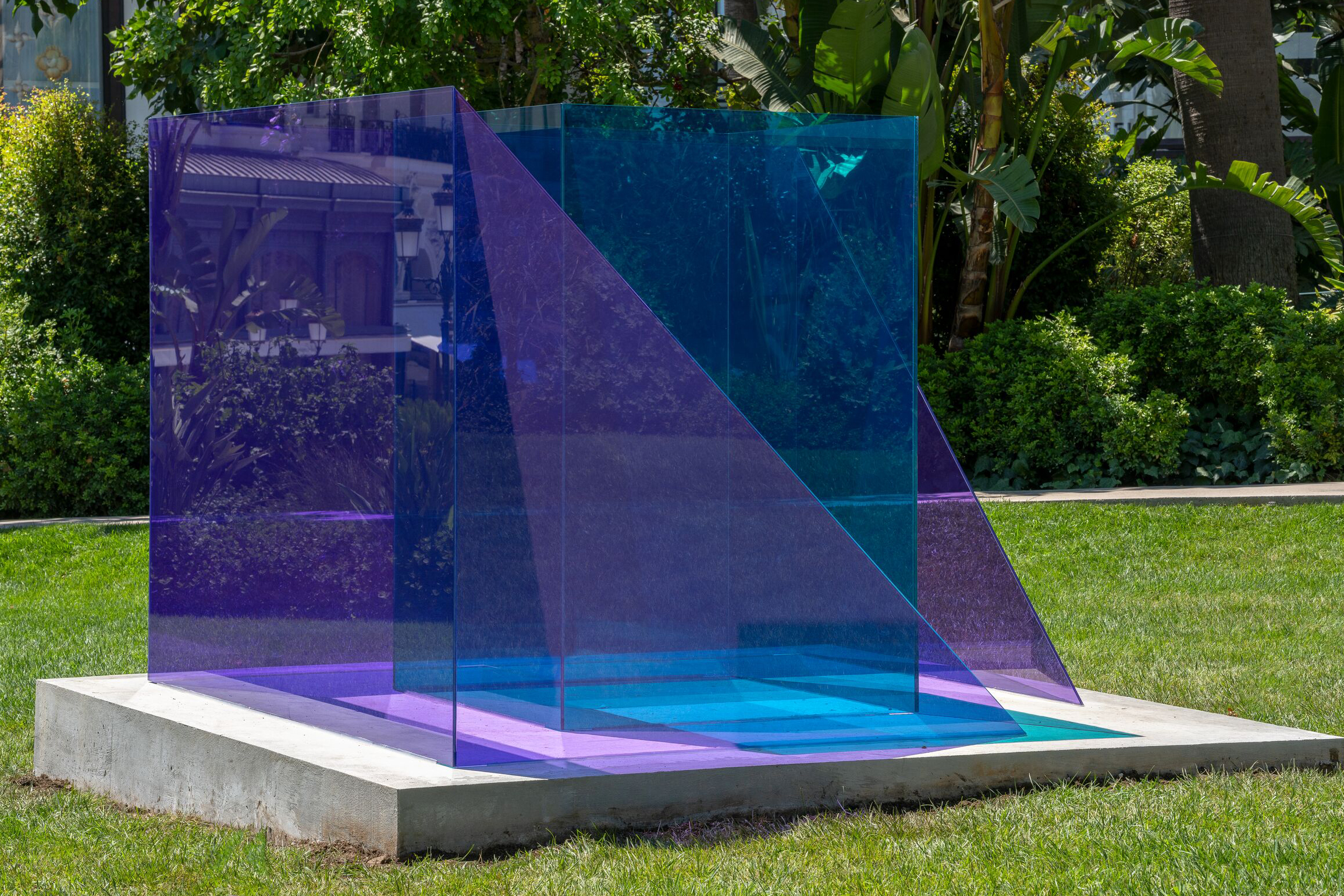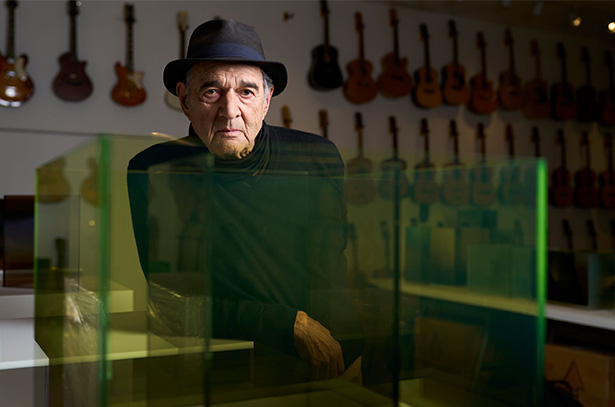LARRY BELL
Works from the 1970s
4 JUNE – 31 AUGUST
MONACO
The exhibition focuses on Larry Bell’s architecturally scaled works from the 1970s, known as standing walls. The large scale works in this show are among his most ambitious early works and follow a rigorous, radical and austere economy of means. They reflect a change in Bell’s work that occurred in the late 1960s when he abandoned the use of metal frames in his sculptures, towards free-standing glass panels joined with silicone, allowing him to work on a much grander scale, determined by the body. This also saw him move away from the pure form of the cube, towards an exploration of architectural and mural geometries, not just squares but corners and zig-zags.
EXPLORE THE EXHIBITION
The exhibition consists of the four large-scale glass sculptures from the early 1970s, along with ‘Moving Ways,’ a monumental late 1970s wall work. These works highlight Bell’s historic contribution to a severely pared down aesthetic and how his work at this stage addresses not just the viewer’s gaze but the perceiving body (Bell’s recourse to corporeal phenomenology), both characteristics that can be allied to minimalism. To signal and compliment the exhibition, a more recent, highly coloured glass work will be installed outdoors in the Jardins des Boulingrins adjacent to the gallery during the course of the exhibition. The rare, museum-quality works that will be shown come primarily from important Italian collections, such as the Panza Collection. This includes the work ‘Untitled’ (1970) which was featured in a key solo exhibition of Bell’s work in Rome in 1974.

Untitled
1970

Two Glass Walls
1971-1972
Larry Bell, born in Chicago in 1939, is one of the most renowned and influential artists to emerge from the Los Angeles art scene of the 1960s, alongside contemporaries Ed Ruscha and Robert Irwin. Known foremost for his refined surface treatment of glass and explorations of light, reflection and shadow through the material, Bell’s understanding of the potential of glass and light allows him to expand visual and physical fields of perception, and his sculptures to surpass traditional bounds of the medium.

Two Glass Walls
1971-1972

Untitled
1970
Since 1969, Larry Bell has used his own high-vacuum coating system that allows him to deposit thin metal films onto his glass surfaces, harnessing a little-known technique developed for aeronautics to create a highly original body of work. Bell’s use of commercial industrial processes in his studio since the 1960s demonstrates his unparalleled skill and dedication in each step of his sculptures’ fabrication.
‘Although we tend to think of glass as a window, it is a solid liquid that has at once three distinctive qualities: it reflects light, it absorbs light, and it transmits light all at the same time.’
LARRY BELL
In 1978, Larry Bell began experimenting with a modified version of the vacuum coating process, to make his ‘vapor drawings’ on paper. The unique large-scale wall work ‘Moving Ways’ (1978), made from applying aluminum on black paper, comprises five individual drawings hung together to make up a multi-panelled composition. In the ‘vapor drawings,’ Bell controls the density of the metallic coating, much like his glass works, in order to vary degrees of transparency and opacity across their surface. Thus, the drawings emulate and complement the elusive, reflective and spatial qualities that are present in his sculptural works.

Moving Ways
1978

The Blue Gate
2021
Outside in the Jardins des Boulingrins, the major sculpture ‘The Blue Gate’ (2021) is shown. This much more recent work shows the development of Bell’s practice. This is most apparent though his masterful adoption of colour achieved by employing the very different medium of monochrome colour-laminated glass. While related to the earlier standing walls in its scale and relation to the body, here the form has also become more complex through the use of contained or intersecting forms and triangular glass panes to create diagonals. This work is comprised of panes of vibrant amethyst purple and peacock blue. These colours overlap, reveal-ing a variety of mixed hues through their layers. It shows how Bell delights in colour contrasts and complementarity, as well as their mixing through the special transparency afforded by glass.

LARRY BELL: GLASS
For our Ursula 9 Issue, Larry Bell took us inside his studio in Taos, New Mexico, to talk about his work with glass, metals and other materials to create ethereal effects of light, mass and volume in sculpture. For more than half a century, Bell has pioneered the use of the vacuum tank to achieve these ends, which he describes as ‘improbable surfaces.’
About the Artist

Larry Bell
Larry Bell is one of the most renowned and influential artists to emerge from the Los Angeles art scene of the 1960s, alongside contemporaries Ed Ruscha and Robert Irwin, and had garnered international repute by the age of 30. Known foremost for his refined surface treatment of glass and explorations of light, reflection and shadow through the material, Bell’s significant oeuvre extends from painting and works on paper to glass sculptures and furniture design.Bell’s understanding of the potential of glass and light allows him to expand visual and physical fields of perception, and his sculptures to surpass traditional bounds of the medium. He has said: ‘Although we tend to think of glass as a window, it is a solid liquid that has at once three distinctive qualities: it reflects light, it absorbs light, and it transmits light all at the same time.’
Bell’s use of commercial industrial processes in his studio, located in Venice, California since the 1960s and Taos, New Mexico since the 1970s, demonstrates his unparalleled skill and dedication in each step of his sculptures’ fabrication. Since 1969, his studio has managed its own high-vacuum coating system that allows him to deposit thin metal films onto his glass surfaces, harnessing a little known technique developed for aeronautics to create an unprecedented body of work.
Current Exhibitions
1 / 11

















